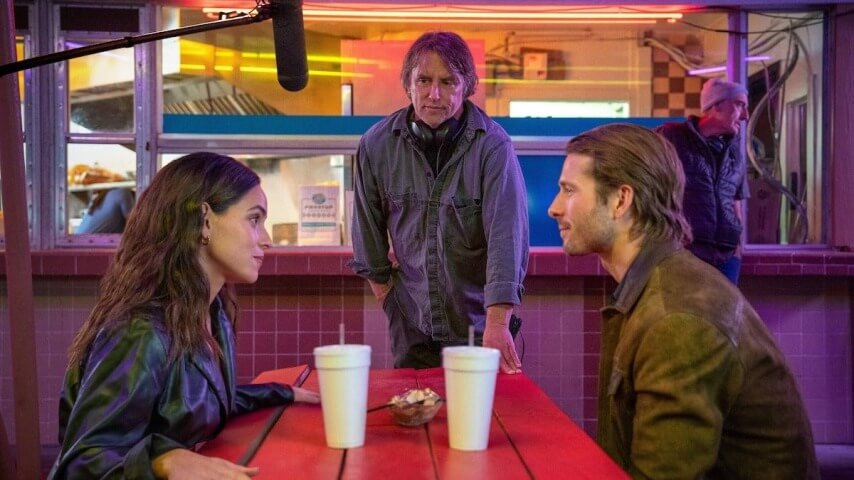Richard Linklater discusses the cinematic myth of hired guns and channeling “good old '80s sex” in Hit Man
The filmmaker deconstructs the hitman movie while keeping it steamy

Loosely based on a 2001 Texas Monthly profile, Richard Linklater’s Hit Man mythologizes the life of Gary Johnson, a part-time college professor who moonlighted as a fake hit man for the Houston Police Department. Of course, Linklater’s film—co-written by the director and star Glen Powell, who plays Johnson—takes some major liberties: Houston is swapped for tax credit-friendly New Orleans, a would-be client named Madison (Adria Arjona) turns into Gary’s clandestine lover and a murderous conspiracy unfolds thereafter. While the real-life Gary donned (literal) home-spun costumes in order to tailor himself to each customer’s cold-blooded expectations (just like his on-screen counterpart), he almost certainly didn’t get lost in the persona of “Ron,” a suave, masculine heartthrob who enchants Madison. As Gary further loses himself in the inherent chaos of Ron, he becomes embroiled in a complex situation with no easy way out.
Speaking of other recent hit men films—namely the fellow Venice-premiering Aggro Dr1ft and The Killer—Linklater considers his film to be a “deconstruction” more than a continuation of this storied cinematic mythos, even if he does fabulate Gary Johnson’s lived experience in order to unpack a narrative trope. “They’re called movies,” he joked via a recent phone call. “They’re lies…and that’s okay. They’re good stories.” Indeed, Hit Man is another taut and compelling entry in the director’s impressive oeuvre, which will soon include even more major swings, like a black-and-white French-language feature and a musical production spanning 20 years.
Ahead of Hit Man’s Netflix streaming debut, Linklater spoke to The A.V. Club about the cinematic origins of contract killers, channeling “good old ‘80s sex” between Powell and Arjona, as well as his future projects based on Jean-Luc Godard and Stephen Sondheim.
The A.V. Club: While you’ve made several films that are overtly sexy or hinge on certain characters’ quest to “score,” Hit Man depicts a relationship evolving through several sex scenes, which feels novel for you. What made this erotic component so vital to the story?
Richard Linklater: Well, that’s the way this story works. Sex would drive someone to the behavior and the risks they’re taking. It’s the kind of passion that [Gary] talks about and is questing for in the movie. You see his transformation into someone who is that passionate, sexual [being]. It’s seen as kind of a good thing, but when you do that as a human, you’re heading into more risky territory. You’re very vulnerable, not only personally, but people start doing weird things. A lot comes out of that sexual passion that can be harmful. You put yourself in a volatile spot, let’s say. That had to be very real—and hopefully sexy—to understand the behavior in the story.
Another thing is that I’ve had sex scenes in my movies before. It’s just not setting the background of the characters and the story. I was never one to just throw in a sex scene for no reason. I’ve always been against gratuitous sex. Someone quoted at me saying, “Glen Powell said that this was your first sex scene!” I was like, “What’s he talking about?! Glen Powell was in a sex scene in Everybody Wants Some!!” Maybe he doesn’t consider it a sex scene, certainly it isn’t at the level [of Hit Man], but it’s been a good example of having had sex scenes in my movies.
AVC: You say that you’ve never been one for gratuitous sex scenes, but do you think that the current climate around sex scenes in movies had any influence on you wanting to structure the relationship in this film around sex? Or was that just something that came naturally from the writing process?
RL: I mean, yeah, I’m not directly responding to, like, “Oh, there isn’t enough sex so I’m going to make a sex movie!” That wasn’t my motive, but as I got into it I couldn’t help but notice in our culture, even after we’d done the movie, that, “Oh yeah, people are saying there aren’t sex scenes anymore.” I just hadn’t really thought about that. I guess superhero movies are pretty sexless. They don’t seem to have genitalia. There’s been this infantilization of cinema going on for the last generation, where the mentality went from adult to child—or adolescent, let’s say. Pre-sex. Naturally, that just means there aren’t many sex scenes. It doesn’t figure in stories, because they’re not adult situations. Which is unfortunate, because film is supposed to reflect the real world. But mainstream movies have largely reduced the mentality to such a youthful, childlike state. That’s just where the industry has gone. We shouldn’t be the exception, it shouldn’t be unusual. We joked even while we were making it, “This is like an ‘80s movie. This is our Adrian Lyne 9 ½ Weeks or Body Heat.” Good old ‘80s sex. They were just doing it in a way that totally elevated the plot.


![HBO teases new Euphoria, Larry David, and much more in 2026 sizzle reel [Updated]](https://img.pastemagazine.com/wp-content/avuploads/2025/12/12100344/MixCollage-12-Dec-2025-09-56-AM-9137.jpg)





































